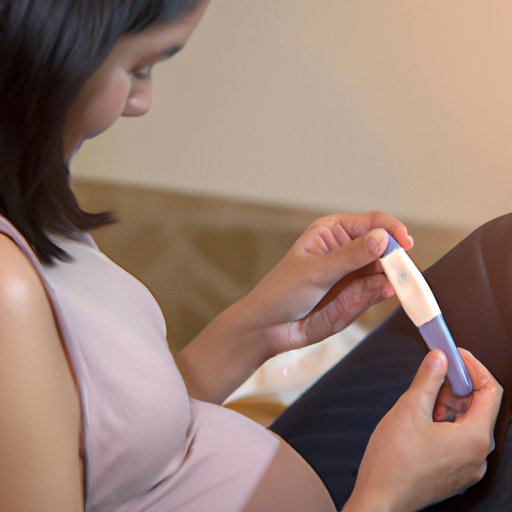
Introduction
One of the most exciting yet nerve-wracking experiences for women is trying to determine whether or not they are pregnant. However, deciphering early pregnancy symptoms can be a challenging task, especially for first-time mothers. In this article, we will explore how soon pregnancy symptoms appear, which symptoms to look out for, and when it’s time to seek medical advice.
The Early Signs: A Guide to Recognizing Pregnancy Symptoms in the First Week
The initial signs of pregnancy may be subtle and easily mistaken for other conditions. Some of the most common early pregnancy symptoms include:
- Fatigue and exhaustion
- Implantation bleeding
- Abdominal cramping
- Nausea or vomiting
- Breast changes or tenderness
To identify these symptoms, it’s essential to track your menstrual cycle and recognize any changes or abnormalities. If you notice any of these symptoms, take a pregnancy test and schedule a visit with your healthcare provider.
Is It Possible? Understanding How Soon You Can Experience Pregnancy Symptoms
After fertilization, the fertilized egg travels to the uterus and implants itself in the lining. Once this occurs, the body begins to produce pregnancy hormones like human chorionic gonadotropin (hCG) and progesterone. These hormones are responsible for the various physical and emotional changes that occur during pregnancy.
Generally, it takes around 6-10 days for the fertilized egg to implant itself in the uterine wall, and another 3-4 days for hCG to become detectable in the body. Therefore, the earliest possible time for pregnancy symptoms to appear is around 10 days after fertilization. However, every woman’s body is different, and some may experience symptoms earlier or later than others.
From Conception to Nausea: Tracking the Timeline of Pregnancy Symptoms
As pregnancy progresses, physical and emotional changes will occur, and pregnancy symptoms will become more apparent. Here is a week-by-week guide to the most common pregnancy symptoms:
- Weeks 1-4: Missed period, fatigue, and breast changes
- Weeks 5-8: Nausea, vomiting, and food cravings/aversions
- Weeks 9-12: Increased fatigue, mood swings, and frequent urination
- Weeks 13-16: Visible belly growth, stretch marks, and back pain
- Weeks 17-20: Braxton Hicks contractions, constipation, and leg cramps
- Weeks 21-24: Heartburn, shortness of breath, and nasal congestion
- Weeks 25-28: Swollen feet and ankles, and difficulty sleeping
- Weeks 29-32: Increased fetal movement, frequent urination, and fatigue
- Weeks 33-36: Shortness of breath, back pain, and contractions
- Weeks 37-40: Insomnia, fatigue, and frequent contractions
It’s crucial to seek regular prenatal care during pregnancy to monitor symptoms, ensure healthy development of the fetus, and detect any complications early.
Pregnancy Symptoms 101: Debunking Common Myths and Misconceptions
There are several common myths and misconceptions surrounding pregnancy symptoms. Here are a few:
- Myths: Morning sickness means it’s a girl, and pregnancy cravings indicate the baby’s gender.
- Truth: There is no scientific evidence to support these beliefs. Morning sickness and cravings are typical during pregnancy and are not related to the baby’s gender.
- Myths: All pregnant women experience the same symptoms and severity.
- Truth: Every woman’s body and pregnancy experience are different. Some may experience severe symptoms while others experience very few, if any.
- Myths: You can’t get pregnant while breastfeeding or on your period.
- Truth: While less likely, it’s still possible to become pregnant while breastfeeding or during menstruation. Always use proper contraceptive measures if you wish to avoid pregnancy.
Expect the Unexpected: Uncommon Pregnancy Symptoms You Shouldn’t Ignore
While less common, some pregnancy symptoms may indicate a more serious issue. If you experience any of these symptoms, seek medical attention immediately:
- Vaginal bleeding or discharge
- Changes in vision or severe headaches
- Severe abdominal pain or cramping
- High fever or chills
- Painful or burning urination
- Severe nausea and vomiting
- Difficulty breathing or chest pain
First-Hand Accounts: Real Women Share Their Experiences with Early Pregnancy Symptoms
Here are some real women’s experiences with early pregnancy symptoms:
- “I knew I was pregnant when I started getting hot flashes and sweating through my clothes, even though it wasn’t hot outside.”
- “I had cramping and light spotting around the time my period was due, but it was much lighter than usual. That’s when I took a pregnancy test, and it was positive.”
- “The first thing I noticed was that my breasts were much fuller and sore than usual. That’s what made me suspect I was pregnant.”
These experiences demonstrate the variability of early pregnancy symptoms and how they can differ from person to person.
Conclusion
Overall, pregnancy symptoms can vary from person to person, but there are common signs to look out for. Understanding the process of fertilization and embryo development can help you recognize symptoms and confirm a pregnancy. Always seek medical care if you experience concerning symptoms or have any questions or concerns.





